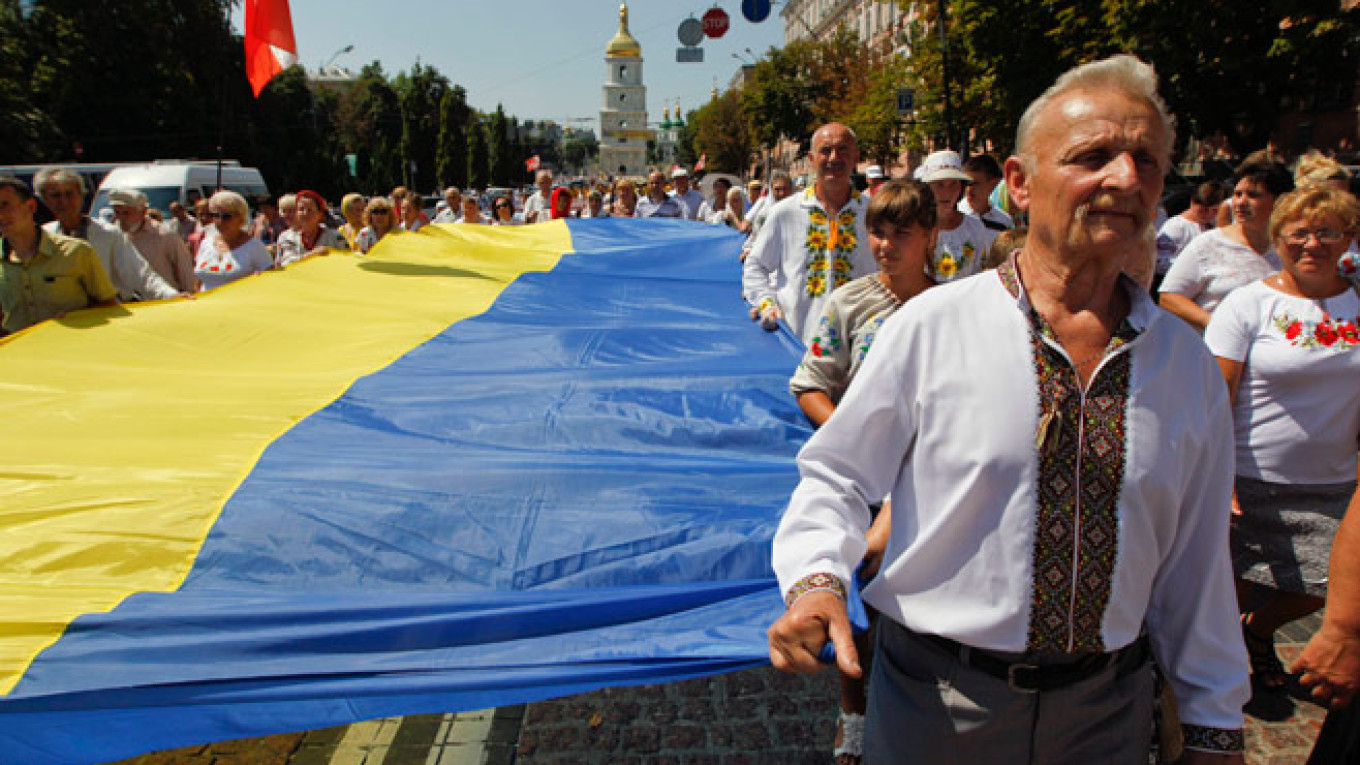Exactly one year ago, President Vladimir Putin went to Ukraine for an official two-day visit to celebrate the 1025th anniversary of the Christianization of Kievan Rus, an occasion that, according to Putin, reminded Russia and Ukraine of their "spiritual unity and common roots."
Putin participated in a service on the Dnepr River with the leaders of Serbia, Moldova and the ill-fated then-president of Ukraine, Viktor Yanukovych. The ceremony was marred by protests: Several Ukrainian nationalists protested on Kiev's European Square against what they said was "dragging Ukraine into another of Russia's nationalist projects."
Around that time, 82 percent of Ukrainians viewed Russia mostly or very positively, according to a November 2013 poll conducted by Kiev's International Sociology Institute among among 2,022 respondents with the margin of error not exceeding 3.3 percent.
Today, after Russia's annexation of Crimea and the simmering conflict by Russia-leaning separatists in eastern Ukraine, no one is talking about the 1,000-year unity of two once-brotherly Slavic nations.
No Pro-Russia Elite
Ukraine's political elite has never been pro-Russian, as being Moscow's client robs them of authority and sovereignty, argued Dmitry Trenin, director of the Carnegie Moscow Center think tank.
"If Ukraine comes closer to Russia, it becomes Malorossia [a region of the Russian empire that roughly corresponds to present-day Ukraine], regardless of what its leaders want," Trenin told Ekho Moskvy radio in an interview broadcast Friday.
Ukraine's second president Leonid Kuchma, whose reign ended with the first mass pro-Western protest in Kiev in 2003, wrote a book with the self-explanatory title: "Ukraine Is Not Russia."
More recently, Russia — which heavily sponsored Ukraine's economy for 23 years after the collapse of the Soviet Union — has been unable to create a pro-Russian belt within Ukraine spanning across the country's southeast from the Kharkiv region to Odessa that would have acted as a counterbalance to pro-Western authorities in Kiev, and the reason for this failure was precisely because those areas lacked strong pro-Russian elites, said Trenin.
Vladimir Bruter, an analyst with the International Institute of Humanitarian and Political Studies, a Kiev-based think tank, believes that Ukrainian elites will largely stay pro-Western, as orientation toward Europe and the EU does not threaten the individual prospects of its members.
"The Ukrainian establishment has always been afraid of integrating with Russia, as this move would make its own existence meaningless," he told The Moscow Times in a phone interview.
"They would agree to pursue such a project on an equal basis, but they know it is not possible, given Russia's superiority in size and power," he said.
Past Illusions
Despite many media reports describing the previous regime in Kiev as largely pro-Russian and even as a puppet of Moscow, Yanukovych, who was ousted from power in late February, was never a pro-Russian president as such, and his Party of Regions was never a pro-Russian party, analysts said.
"The Party of Regions was an organization that united government officials who used its platform to lobby their interests and careers. It was never a pro-Russian political force," Mikhail Pogrebinsky, head of the Kiev Center of Political and Conflict Studies, told The Moscow Times.
The Party of Regions actively promoted Ukraine's closer rapprochement with Europe, while Yanukovych himself repeatedly asserted his pro-European stance.
"Pro-European choice remains the strategic direction of Ukraine's further civilizational development," Yanukovych said at an Eastern Partnership summit in Lithuania in November, three months before he was thrown out of office by a popular uprising in central Kiev. He had angered many factions in Ukraine — from hardcore nationalists to liberal proponents of closer ties with Europe — after suspending the EU integration process and getting a multi-billion package of financial perks from Putin.
During his visit to Kiev last year, Putin met with the Ukrainian Choice organization led by Viktor Medvedchuk, the former head of Ukraine's presidential administration under Kuchma and a personal friend of Putin.
Bruter, who took part in organizing that meeting, said it gathered "all the pro-Russian people in Ukraine," but that it ended with "nothing, as there was no agenda for the future, and everybody realized that it was not possible to create such a movement."
See also:
In Ukraine, West's 'Terrorists' Are Russia's Heroes
Contact the author at [email protected]
A Message from The Moscow Times:
Dear readers,
We are facing unprecedented challenges. Russia's Prosecutor General's Office has designated The Moscow Times as an "undesirable" organization, criminalizing our work and putting our staff at risk of prosecution. This follows our earlier unjust labeling as a "foreign agent."
These actions are direct attempts to silence independent journalism in Russia. The authorities claim our work "discredits the decisions of the Russian leadership." We see things differently: we strive to provide accurate, unbiased reporting on Russia.
We, the journalists of The Moscow Times, refuse to be silenced. But to continue our work, we need your help.
Your support, no matter how small, makes a world of difference. If you can, please support us monthly starting from just $2. It's quick to set up, and every contribution makes a significant impact.
By supporting The Moscow Times, you're defending open, independent journalism in the face of repression. Thank you for standing with us.
Remind me later.


